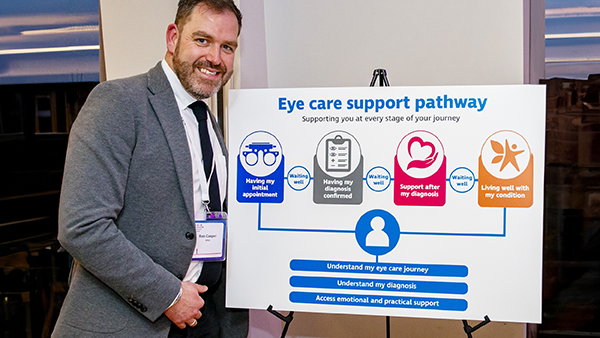You are viewing 1 of your 3 articles before login/registration is required
Patient Communication: Notes for the New Optometrist
Newly qualified optometrists have spent years learning all the optical terminology – but how do they convey that information to patients?
Communication is crucial in eye care. Good communication puts patients at ease – they are more likely to give you the information you need, as well as being more receptive to the information you need to give them. For optometrists, communication is now a compulsory CPD element (1) – the result of the number of complaints and legal cases that have stemmed from a lack of communication between optometrists and their patients. Indeed, most issues that come to the Optical Consumer Complaints Service are driven by a breakdown in communication and trust; they are “rarely concerned with clinical errors.” (2)
Optometrists will encounter many challenging communication cases. There are always patients who require more time. They may have cognitive issues, such as dementia, for example – or they may tell you they have such conditions, even when they do not (you sometimes have to be a detective to figure this out, but it gets easier with experience.) They may be deaf, have a speech impairment, or be unable to speak English and require a family member to translate.
Some of these cases can be testing for experienced optometrists, so they are particularly challenging for newly qualified (NQ) optoms and pre-reg students. It can be very difficult to put your clinical skills and knowledge into layman’s terms. You may have spent three years learning all the technical terminology, but now you have to explain it to an eight- or 80-year-old. And though it may be the umpteenth time you’ve discussed a cataract with a patient, it is the first time that this patient has heard the information – so you must get it right.
The pre-reg year presents an opportunity for new optometrists to learn these skills from their patient-facing colleagues, especially in a larger store with a big team. You can observe what experienced colleagues say to patients and how they say it. But when you pass your pre-reg year and move out of that “comfort zone” and away from your mentor, you can be faced with ocular presentations that you may not have encountered before.
Suddenly, you find yourself on your own with the need to convey potentially difficult or complex information to a patient.
Here are three easy to remember tips:
i) Be led by the patient on how much information they appear to want to receive.
ii) Maintain eye contact and have open body-language.
iii) Look for non-verbal cues in the patient’s facial expression, posture, and gaze.
Breaking bad news is always a difficult conversation but, in our profession, it can happen on a daily basis. Notably, it’s not always about ocular conditions and diseases; it could be telling a young person they need to wear glasses when they don’t want them or telling a person wanting contact lenses for a special occasion that they are not suitable. Ultimately, you must be honest, truthful, and transparent with the information you impart. Most importantly, patients’ wishes must be respected. If they don’t want to talk to family members about their problem or condition, for example, you must respect that right to confidentiality.
Clear communication extends to documenting all advice that was given to a patient, whether it be oral or written (for example, patient information leaflets). Your communication should be clear and consistent with the professional guidelines and advice given by the professional bodies, such as ABDO, FODO, AOP, the College of Optometrists, and the GOC.
At all times, optometrists must be empathetic. You should avoid negative words and use open questions, such as
- “How are your eyes at the moment?”
- “When was the last time you had an eye examination?”
- “Who in your family has any eye conditions?”
- “Why do you feel that your vision has changed?”
- “How bad is the pain in your eye on a scale of 1 to 10?” (2)
Optometrists have a duty of candor – they should admit that mistakes can happen and be honest when this occurs, even if it is not their mistake. They also need to remain professional about the optical sector at all times and not, for example, criticize optometrists in other practices. Other behaviors, such as stopping writing or typing when delivering important information and allowing patients time to ask questions, are also important. And if you don’t know an answer, let the patient know this and direct them to someone who does know or tell them you will find the answer.
Good communicators are able to talk to anyone – from children to pensioners, whatever their social and ethnic background. How do optometrists develop these skills? The answer is quite simple – they try to get on the same wavelength as their patient as quickly as possible. When you establish some common ground between you and the patient, the task becomes much easier.
In the meantime, NQ optoms can find some great resources for the development of communication skills available at The College of Optometrists and DOCET.
Lorcan Butler is Optical Engagement Manager for The Brain Tumour Charity and a qualified dispensing optician and optometrist.
References
- General Optical Council, Continuing Professional Development (CPD): A guide for registrants (2022).
- Optical Consumer Complaints Service, How Better Processes Can Lead to Better Outcomes. Available at bit.ly/3QmxKWY
- H Webb et al., “The problem with ‘problems’: The case of openings in optometry consultations,” Research on Language and Social Interaction, 46, 65 (2013).
The New Optometrist Newsletter
Permission Statement
By opting-in, you agree to receive email communications from The New Optometrist. You will stay up-to-date with optometry content, news, events and sponsors information.
You can view our privacy policy here
Most Popular
Sign up to The New Optometrist Updates
Permission Statement
By opting-in, you agree to receive email communications from The New Optometrist. You will stay up-to-date with optometry content, news, events and sponsors information.
You can view our privacy policy here
Sign up to The New Optometrist Updates
Permission Statement
By opting-in, you agree to receive email communications from The New Optometrist. You will stay up-to-date with optometry content, news, events and sponsors information.
You can view our privacy policy here








